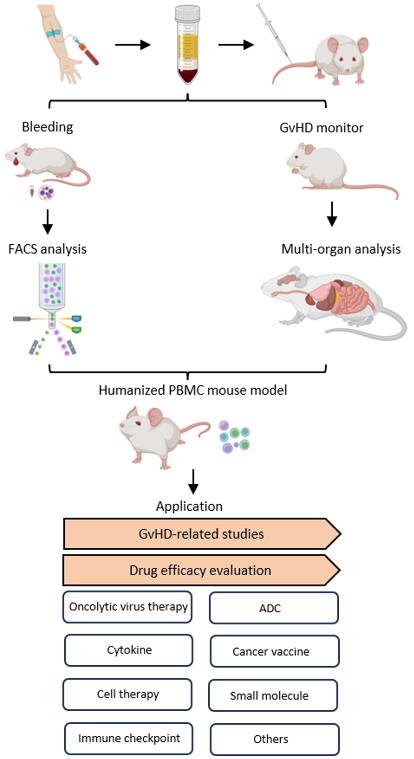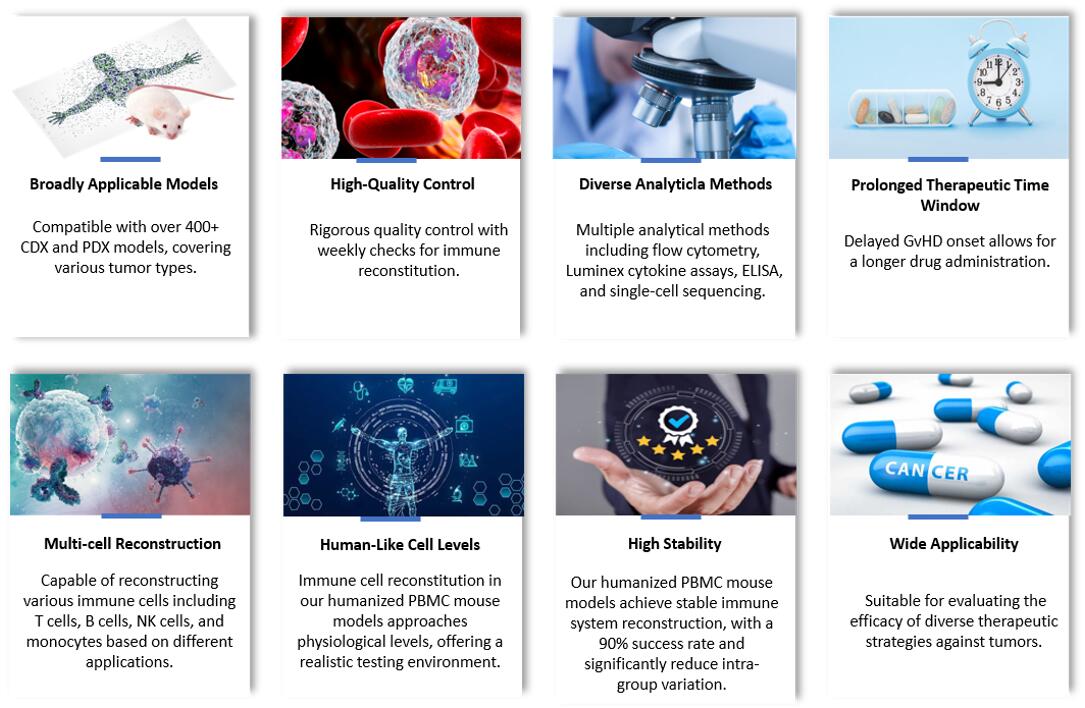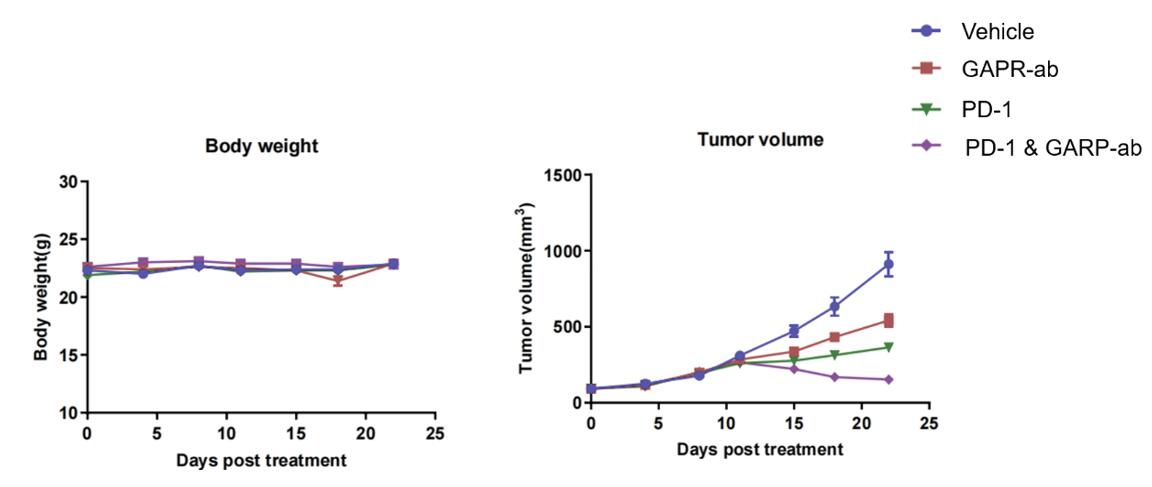Humanized PBMC Mouse Models
Creative Bioarray has developed highly stable, humanized peripheral blood mononuclear cell (PBMC) mouse models that are seamlessly compatible with both Cell Line-Derived Xenograft (CDX) and Patient-Derived Xenograft (PDX) models. These advanced models serve as invaluable tools in assessing the efficacy of our clients' test compounds. Our expertise in crafting PBMC humanized mouse models underscores our dedication to delivering reliable and cutting-edge solutions for preclinical research, ensuring that our customers can confidently evaluate the therapeutic potential of their compounds within a highly relevant in vivo system. With Creative Bioarray, you can anticipate unparalleled support and innovative approaches throughout your drug development journey.
Incorporating human immune cells into in vivo models is crucial for advancing research in cancer therapy, and the study of tumor immunity. The process of humanizing mice, particularly through the use of PBMCs, is of significant interest due to the ease and speed with which these cells can be implanted into immunodeficient mice. This approach results in the rapid engraftment of human immune cells, creating a PBMC-humanized mouse model that offers a cost-effective solution for short-term oncology studies.
Our Humanized PBMC Mouse Models
As a leading innovator in the field of humanized immune system models, Creative Bioarray offers a diverse array of sub-platforms tailored to meet the specific needs of our customers. According to different application, we provide the following specialized models:
 Fig. 1 Workflow of establishing humanized PBMC mouse models.
Fig. 1 Workflow of establishing humanized PBMC mouse models.
Key Advantages
Creative Bioarray has conducted extensive research and iteration on the PBMC model to develop stable humanized PBMC mouse models with the following advantages:
 Fig. 2 Advantages of humanized PBMC mouse models in Creative Bioarray.
Fig. 2 Advantages of humanized PBMC mouse models in Creative Bioarray.
Example Data
 Fig. 3 Effect of immune checkpoint inhibitors on body weight and tumor volume in mice reconstructed with human peripheral blood mononuclear cell-derived T cells.
Fig. 3 Effect of immune checkpoint inhibitors on body weight and tumor volume in mice reconstructed with human peripheral blood mononuclear cell-derived T cells.
Quotation and Ordering
Creative Bioarray has successfully developed stable humanized PBMC mouse models to significantly aid in your oncology research endeavors. We also offer bespoke humanized mouse models, meticulously designed to assess the efficacy of your innovative anti-cancer agents or cancer immunotherapies. If you are interested in our services, please feel free to contact us at any time or submit an inquiry to us directly.
For research use only. Not for any other purpose.
Disease Models
- Oncology Models
-
Inflammation & Autoimmune Disease Models
- Rheumatoid Arthritis Models
- Glomerulonephritis Models
- Multiple Sclerosis (MS) Models
- Ocular Inflammation Models
- Sjögren's Syndrome Model
- LPS-induced Acute Lung Injury Model
- Peritonitis Models
- Passive Cutaneous Anaphylaxis Model
- Delayed-Type Hypersensitivity (DTH) Models
- Inflammatory Bowel Disease Models
- Systemic Lupus Erythematosus Animal Models
- Oral Mucositis Model
- Asthma Model
- Sepsis Model
- Psoriasis Model
- Atopic Dermatitis (AD) Model
- Scleroderma Model
- Gouty Arthritis Model
- Carrageenan-Induced Air Pouch Synovitis Model
- Carrageenan-Induced Paw Edema Model
- Experimental Autoimmune Myasthenia Gravis (EAMG) Model
- Graft-versus-host Disease (GvHD) Models
-
Cardiovascular Disease Models
- Surgical Models
- Animal Models of Hypertension
- Venous Thrombosis Model
- Atherosclerosis model
- Cardiac Arrhythmia Model
- Hyperlipoidemia Model
- Doxorubicin-induced Heart Failure Model
- Isoproterenol-induced Heart Failure Model
- Arterial Thrombosis Model
- Pulmonary Arterial Hypertension (PAH) Models
- Heart Failure with Preserved Ejection Fraction (HFpEF) Model
- Cardio-Renal-Metabolic (CKM) Syndrome Model
-
Neurological Disease Models
- Alzheimer's Disease Modeling and Assays
- Seizure Models
- Parkinson's Disease Models
- Ischemic Stroke Models
- Acute Spinal Cord Injury (ASCI) Model
- Traumatic Brain Injury (TBI) Model
- Hypoxic-Ischemic Encephalopathy (HIE) Model
- Tourette Syndrome (TS) Model
- Amyotrophic Lateral Sclerosis (ALS) Model
- Huntington's Disease (HD) Model
- Intracerebral hemorrhage (ICH) Models
- Schizophrenia Model
- Depression Models
- Pain Models
-
Metabolic Disease Models
- Type 1 Diabetes Mellitus Model
- Type 2 Diabetes Mellitus Model
- Animal Model of Hyperuricemia
-
Nonalcoholic Fatty Liver Disease Model
- High-Fat Diet-Induced Nonalcoholic Fatty Liver Disease (NAFLD) Model
- Methionine and Choline Deficient (MCD) Diet-Induced Nonalcoholic Fatty Liver Disease (NAFLD) Model
- Gubra-Amylin NASH (GAN) Diet-Induced Nonalcoholic Fatty Liver Disease (NAFLD) Model
- Streptozotocin (STZ) Induced Nonalcoholic Fatty Liver Disease (NAFLD) Model
- High Fat Diet-Induced Obesity Model
- Diabetic Foot Ulcer (DFU) Model
- Cardio-Renal-Metabolic (CKM) Syndrome Model
- Liver Disease Models
- Rare Disease Models
- Respiratory Disease Models
- Digestive Disease Models
-
Urology Disease Models
- Cisplatin-induced Nephrotoxicity Model
- Unilateral Ureteral Obstruction Model
- 5/6 Nephrectomy Model
- Renal Ischemia-Reperfusion Injury (RIRI) Model
- Diabetic Nephropathy (DN) Models
- Passive Heymann Nephritis (PHN) Model
- Adenine-Induced Chronic Kidney Disease (CKD) Model
- Kidney Stone Model
- Doxorubicin-Induced Nephropathy Model
- Orthotopic Kidney Transplantation Model
- Benign Prostatic Hyperplasia (BPH) Model
- Peritoneal Fibrosis Model
- Cardio-Renal-Metabolic (CKM) Syndrome Model
- Orthopedic Disease Models
- Ocular Disease Models
- Skin Disease Models
- Infectious Disease Models
- Otology Disease Models